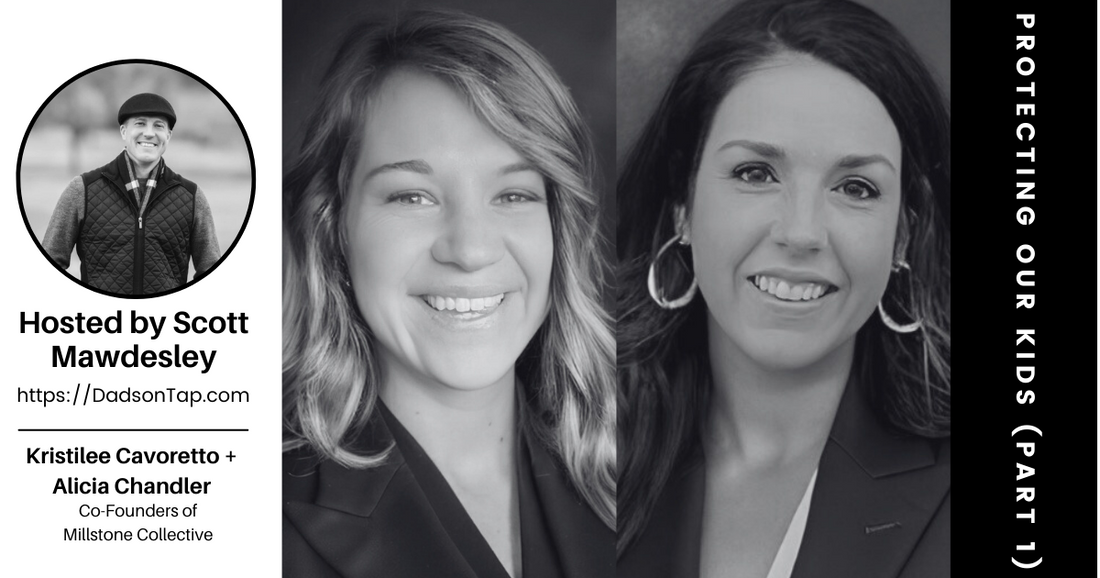How do we protect our kids in a world that feels increasingly unsafe? As dads, what are practical things we can do to help them in sticky situations? Kristilee Cavoretto and Alicia Chandler are the co-founders of Millstone Collective, a training company. One of their specialties is child abuse prevention education.
In this conversation, we take a deep look at ways we can protect your kids. We’ll dive into everything from when and how to start educating our kids to normalizing anatomical terms, behaviors to watch out for, and how to create a safe space for our kids. This is a can’t-miss episode.
You will want to hear this episode if you are interested in...
- What Alicia and Kristlee learned from their dads [1:01]
- How to stay connected with your daughters [3:50]
- Kristilee and Alicia’s background in law enforcement [5:48]
- When and how to start educating your kids [14:15]
- Why we need to normalize anatomical terms [20:29]
- Watch out for a behavioral deviation [25:28]
- How to help your kids out of sticky situations [32:46]
- Creating a safe space for your children [35:53]
- Common things that parents often miss [39:02]
- What we’ll cover on our next episode [45:20]
When and how to start educating your kids
Body exploration starts around two-and-a-half to three years old. As your kids start to become aware of their body parts, you can use that to lay a foundation. Kristilee points out that you can say something like, “Yes, you have these parts and daddy has these parts but they’re private. You don’t touch anyone else’s and they shouldn’t ask to touch yours.” Start having routine conversations young, in the same way you teach a child to look before they cross the road.
While it’s never a child’s job to keep themselves safe, they’re never too young to arm them with the knowledge needed to protect themselves. Have those conversations when they come up naturally and model what’s okay and what’s not. For example, no one should force your child to hug or kiss them. They should know that they can say “no.”
And remember—just because it seems obvious to us doesn’t mean it’s obvious to our children. We need to provide them with a framework to understand and be aware of implied dangers. When we don’t talk about these things at all, we’re setting our kids up to be victims.
Why we need to normalize anatomical terms
Growing up in the South, if you said “penis” or “vagina” you had crossed a line. But the reality is that our children need to know their anatomy. Adults are the ones that make it uncomfortable. We can’t make children think that talking about those parts isn’t okay.
If they don’t know what to call their body parts, it leaves a lot of room open for misinterpretation. Alicia and Kristilee have interviewed close to 2,000 children and far too many name their body parts after food! If a child is taught to call their vagina a “cookie” and try to tell a trusted adult that someone touched their “cookie,” that trusted adult will brush it off. Had the child said “Someone touched my vagina” there is a far different response.
Children will only tell a little bit about what happened to see how people respond to what they’re saying. If they get shut down, it’s unlikely that they’ll say something again. We need to empower our children to have that information. We also need to empower men to be comfortable talking about those things.
Watch out for a behavioral deviation
You know your child and their typical emotional response. If they come home from time with friends, an overnight with a family member, etc. and they’re different from their norm or you see behavioral changes, it’s worth leaning into.
94% of children are assaulted or abused by someone they know and care about. They don’t want them to get in trouble. They just want the bad things to stop. They may not say anything right away. Instead, you may see a behavioral change such as wetting the bed again. Don’t be afraid to ask questions. If they say something off-colored, repeat it back to them and ask them what it means to them. Ask them to define the term(s) they used.
You can also check in with each other at any time. They need to know that no matter what, everything stops and a private conversation happens when they ask to talk. These conversations need to be put in place when they’re younger to build a foundation of trust. It will increase the likelihood that they’ll talk about any topic with you.
Alicia and Kristilee are large proponents of a child having multiple trusted adults in their lives. Because even if you do everything right, a child may still feel nervous to tell you everything. Give them permission to tell those people anything. Those adults can change as your children grow up and people change.
If you institute everything Alicia and Kristlee are talking about right now, it’s never too late to change the trajectory. Start today. Go find your kids and have a conversation about these things. Be honest and transparent. These conversations are incredibly important. Believe what they say has happened.
Connect with Kristilee Cavoretto and Alicia Chandler
- Millstone Collective
- Contact@MillstoneCollective.com
- Follow on Instagram
- Connect with Kristlee on LinkedIn
- Connect with Alicia on LinkedIn
Connect With Scott and Dads on Tap
- The Dads on Tap website
- Follow us on Facebook
- Follow DOT on Instagram: @TheDadsOnTap
Subscribe to DADS ON TAP
Audio Production and Show Notes by - PODCAST FAST TRACK

